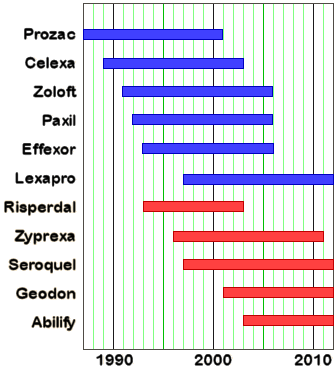


In those sleepy afternoon World History classes, I used to wonder if the people in the empire of this week knew that they were just a chapter away from obscurity. We never talked about them very much [the people] – just their Kings. Years later, when we lived in Europe and saw those castles and the battle-fields, they were peaceful. They didn’t seem to have much to do with the lives of the people on the streets. Tourists gawked, but the locals didn’t even look up as they hurried by. I grew up on the scene of a fierce battle in the Civil War with cannons, monuments, and plaques everywhere – but they were things to climb on for whatever reason kids climb on things. It never occurred to me to wonder if the soldiers memorialized there knew their moment would slowly drift into world history – important maybe, but forgotten.
Should I have started my chart with Thorazine, and added all the neuroleptics [whose differences mattered so much when I was a resident but are now forgotten]? or the tricyclic antidepressants? the benzodiazepines? When did it start, this Age I’m trying to define? I think it actually began with the DSM III – though, of course, there is a history of the why of the DSM III too. And what will we call it, this Age that’s not yet ended? Might it be called the Age of Psycho-Neuro-Pharmacology [from the literary titles of the era, the Age of Emerging-New-Psycho-Neuro-Pharmacology seems more appropriate]. I doubt that the framers of the DSM III would’ve seen it as the beginning of an Age of Emerging-New-Psycho-Neuro-Pharmacology, any more than the personalized medicine aficionados see themselves as ushering in an ending, but that’s the way it seems to be playing out.
I’m writing this as a prequel to an epilogue because that’s where I think we are today. It’s certainly not an end for either neuroscience or psychopharmacology. Those are established basic sciences in medicine that will proceed at whatever pace their scientific creativity supports. But I think we may be approaching the end of the era where bold promises of future glory substitute for current reality, and the financial health of the pharmaceutical industry is any of our business. Oh, I’m not naive. They’ll keep throwing money at KOLs and their boys from the wonder years [many of whom are graying and balding former fairhaired boys]. But I think the days of bullshit science, psychiatrist detail-men, and ghostwritten articles won’t go so well in the coming several years. Science and experience don’t support their hopes for personalized medicine and their credibility quotient has maxed out. The antidepressants have been terminally souped up and are unlikely to yield to any of the genetic tweaking they envision. They seem to have run out of neurotransmitters to turn up and down. Depression is just bigger than drugs. Maybe they’ll find something useful, but this time, it’ll have to work, rather than be just new, novel, promising, or emerging.
Sorry, the comment form is closed at this time.